Weaving education, entertainment
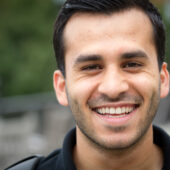 Jawad Wahabzada ('14) finds balancing schoolwork and the global promotion of his documentary "Children of Kabul" a challenge, but says taking courses you love and connecting with a good mentor can make a difference.
Jawad Wahabzada ('14) finds balancing schoolwork and the global promotion of his documentary "Children of Kabul" a challenge, but says taking courses you love and connecting with a good mentor can make a difference.Categories: Arts & Culture, Experiential Learning, Global Wake Forest, Leadership & Character, Mentorship, University Announcements

 As more and more students bring smartphones and tablets to class, mobile apps developed at Wake Forest can help them with things like finding a parking spot and getting their laundry done. With the aid of cross-departmental faculty, several students have developed these free apps through computer science classes or independent studies.
As more and more students bring smartphones and tablets to class, mobile apps developed at Wake Forest can help them with things like finding a parking spot and getting their laundry done. With the aid of cross-departmental faculty, several students have developed these free apps through computer science classes or independent studies.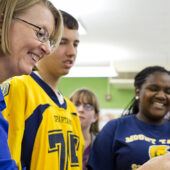 The “Teaching with Tomatoes” program developed by biology professor Gloria Muday takes WFU students to local schools to teach genetics. They reinforce lessons learned in class about how genetics are responsible for the diversity in heirloom tomatoes. Muday estimates the program has reached more than 1,200 students this semester.
The “Teaching with Tomatoes” program developed by biology professor Gloria Muday takes WFU students to local schools to teach genetics. They reinforce lessons learned in class about how genetics are responsible for the diversity in heirloom tomatoes. Muday estimates the program has reached more than 1,200 students this semester.
 Established in 2005, the Dean’s Cup recognizes the Wake Forest athletic team with the highest grade point average each academic year. Recently, men’s track and field/cross country and women’s golf celebrated a three-peat. Each team has captured three consecutive titles.
Established in 2005, the Dean’s Cup recognizes the Wake Forest athletic team with the highest grade point average each academic year. Recently, men’s track and field/cross country and women’s golf celebrated a three-peat. Each team has captured three consecutive titles. 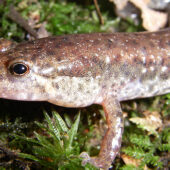 On the heels of one the worst U.S. droughts in more than half a century, a new study by Wake Forest researchers raises questions about the future of one of the most integral members of stream ecosystems throughout the Southeast – the salamander.
On the heels of one the worst U.S. droughts in more than half a century, a new study by Wake Forest researchers raises questions about the future of one of the most integral members of stream ecosystems throughout the Southeast – the salamander.
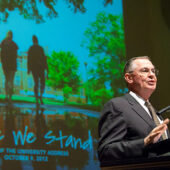 With its strategic plan, Wake Forest charted its path to staying comparable to its best peers, but keeping its priorities and culture distinct. In his annual State of the University speech, President Nathan Hatch outlined Wake Forest's progress along that path.
With its strategic plan, Wake Forest charted its path to staying comparable to its best peers, but keeping its priorities and culture distinct. In his annual State of the University speech, President Nathan Hatch outlined Wake Forest's progress along that path.
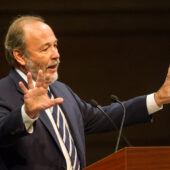 Service is the key to rekindling the American Dream, Time magazine columnist and bestselling author Joe Klein said in his Oct. 10 speech in Wait Chapel. He also shared stories from more than 40 years as a journalist covering politics and wars.
Service is the key to rekindling the American Dream, Time magazine columnist and bestselling author Joe Klein said in his Oct. 10 speech in Wait Chapel. He also shared stories from more than 40 years as a journalist covering politics and wars.